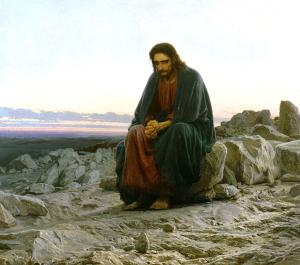 JESUS WEPT Jesus wept. (Courtesy Pixaby/Timeship)
JESUS WEPT Jesus wept. (Courtesy Pixaby/Timeship)
The 11th chapter of John tells the story of a man named Lazarus.
Lazarus was seriously ill, and his sisters sent word to Jesus that they needed him. Jesus was some distance away, but he didn’t hurry to their home as you might expect. He took his time. When he finally did arrive, he was told that Lazarus had died several days earlier.
Jesus saw the mourners’ grief, and he wept.
But the story didn’t end there. Being the Son of God, Jesus knew all along that Lazarus would die and that it would take a miracle to bring him back. Christ performed the miracle, and Lazarus returned to his family.
A Critically Ill Church
In some ways, the story makes me think of the Christian church in America. I see a church that suffers from a deeply rooted and possibly fatal cancer, and I’m not sure we’ll survive. I’m not even sure we deserve to survive.
The future of Christianity in America depends on how effective we are in removing the cancer. If we leave any of it behind, it will probably take hold and threaten future generations of Christians.
Politics and Religion
Politically conservative Christians bear much of the blame for the sorry state of Christianity in America. Christ doesn’t support either political party or tout the moral superiority of the U.S., despite what Republicans say, and he certainly doesn’t walk around with an American flag draped over shoulders.
Yet, the right-wing of the church has poisoned the faith through its unholy alliance with radical right politics.
In some conservative churches, pastors use their pulpits to preach hate-filled, politically focused sermons week after week. They rail against every moderate-to-liberal belief they can find, and congregants respond with the fervor they would show at a political rally.
They forget about God and focus on “owning the libs.”
The Left Responds
The reaction from the left is only a little better. If you Google the words “Christians who have left Christianity,” you will find numerous articles and videos about pastors, high-profile Christians and ordinary people who have left the church.
The backlash against radical Christian politics was inevitable. Rather than fight back, some moderates have metaphorically thrown up their hands and said, “I’ve had enough.” Some have become atheists or agnostics, while others have embraced non-Christian faiths.
I could become completely disillusioned except for the fact that I have a strong belief in Christ. I feel closer to him through my connection with his church, and I understand that he isn’t the problem. People are.
Deep, Wide and Ugly
Politicalization of Christianity in the U.S. is a definite problem, but there’s something that’s deeper. According to numerous religious experts, the deeper problem – the cancer that threatens our church’s survival – is racism.
The two experts I’ve chosen to reference in this post are Dr. Robert P. Jones, head of the non-partisan Public Religion Research Institute, and Dr. Anthea Butler, professor of religion and chair of the University of Pennsylvania Department of Religious Studies.
They have the credentials I wanted in an expert, and they represent two different perspectives. Dr. Jones is, as you noticed, is a man. He’s also white. Dr. Butler is female and black.
Jones and Butler agree that deeply held racist beliefs, which have been handed down from one generation to the next, run through the heart of conservative religion and politics. They are ingrained in people’s hearts, minds and souls, and they are almost impossible to remove.
“Eeny, Meeny, Miny, Moe”
I know Drs. Jones and Butler are right in pointing the finger at racism. As a lifelong southerner, I have seen unwavering bigotry since childhood. I’m not sure how my family escaped the hatred associated with it, but we managed.
Don’t misunderstand me. I’m not saying my family is perfect. Heaven knows, it isn’t. I’m merely saying that I grew up in a home where character mattered and race didn’t.
Even so, the ugly face of racism occasionally found its way into our home. When I was barely old enough to attend school, I came home with a new word that got an instant reaction from my grandmother. (She was the first person in the family to hear me use it.)
The word was part of an otherwise innocent rhyme that begins “eeny, meeny, miny, moe.” The next line is “catch a n**** by the toe.” I had barely gotten the objectionable word out of my mouth when my grandmother stopped me.
She enclosed my small hands in hers, drew me closer, and said something like, “We don’t use that word in our family.”
“Why not?” I asked. “Everybody else said it.”
“It’s a bad word, and it hurts people. It hurts people a lot. Let’s don’t ever use it again.”
That explanation was sufficient for a five- or six-year-old. I adored my grandmother and permanently deleted the offensive word from my vocabulary.
I could still say “eeny, meeny, miny, moe,” but my grandmother suggested I find a different word for the next line. I decided that I would say “tiger.”
An Unholy Alliance
But I digress. Let’s go back to the experts.
Robert P. Jones makes some disturbing points in his book, “White Too Long: The Legacy of White Supremacy in American Christianity.” In it, he examines what he calls an “unholy alliance” between white Christianity and white supremacy in the United States.
He says that white supremacy is encoded in white Christianity’s DNA, and he condemns the church for creating, promoting and protecting our nation’s racial divide.
Jones doesn’t stop there. He says, “The more racist attitudes a person holds, the more likely he or she is to identify as white Christian.”
Think about it. “The more racist attitudes a person holds, the more likely he or she is to identify as white Christian.” It sickens me that white Christianity and white supremacy go hand-in-hand in the U.S.
How can Christians truly believe that white supremacy is acceptable? How can they read the Bible – presumably, the same Bible I read – and hold onto hatred. How can they believe that Christ loves white people more than he loves people of color? For that matter, how can they say he loves straight people and hates gays?
Troubling Facts
Jones also cites some troubling statistics from the 2016 presidential election. He points out that 81 percent of white evangelicals voted for Donald Trump, as did 64 percent of white Catholics and 57 percent of white mainline Protestants. As unbelievable as those percentages are, the percentages in my community were probably higher.
Jones believes that his fellow white Christians need to accept responsibility for their shameful past and make a concerted effort to repair the damage. They need to remove the cancer that’s destroying them.
He concludes that American Christians can either hold onto white Christianity or hold onto Christ. They cannot do both.
The Root is Racism
My other expert, Dr. Anthea Butler, presents similar findings in her newest book, “White Evangelical Racism: The Politics of Morality in America.” She says that white evangelicals play a strikingly “unified and powerful role” in the country’s political disunion, and like, Jones, she says the root of their activism and power is racism.
In her book, Butler traces the evangelical movement’s racist roots from slavery through the Trump presidency. She reminds readers that white evangelicals used scripture to defend slavery before the Civil War (1861-1865), deny blacks their voting rights after the war, and oppose civil rights in the 20th century. Sadly, their racist beliefs remain firmly entrenched in the 21st century.
White Supremacy in the Bible Belt
The relationship between white evangelicalism and white supremacy is undeniable if you look at a map showing our nation’s Bible belt. The history buffs among you will notice that Bible belt states are amazingly similar to states that left the union in 1861 and formed the Confederacy to preserve slavery.
Disunion then and disunion now….
I sometimes wonder how millions of white Christians can claim to follow God but despise the dark-skinned people he created.
If you accept God as the creator of humanity, which I do, then you must accept that he created people of every race, ethnicity and culture on earth.
If you believe that God is infallible, as I do, then you must accept that he did not make any mistakes.
Yet here we are. Christians in this country are tearing one another apart, and there’s no relief in sight.
Dr. Butler – like Dr. Jones – believes that evangelical racism is a festering sore, and there “needs a reckoning now.” If it comes, it will be ugly and painful, but it must come if the American church is to survive.
Christian Carnage
Can we survive?
It seems almost impossible when you read stories like the one about the National Christian Foundation. In recent years, it accepted around $56 million from anonymous donors to support about two dozen anti-LGBT and anti-Muslim hate groups.
There’s also a story about the Texas pastor who recently told his congregation that the government should execute every single gay person in this country for committing the “abomination of homosexuality.” Line them up and put a bullet through their heads, he preached from his pulpit one Sunday morning.
Jesus Still Weeps
Healing the Christian church in the U.S. may take a miracle not unlike the miracle of Lazarus. In the meantime, I imagine Christ looking at us through tears that fill his eyes and stream down his face, just as they did when Lazarus died.
Jesus wept for Lazarus and his family, and he weeps for us.












